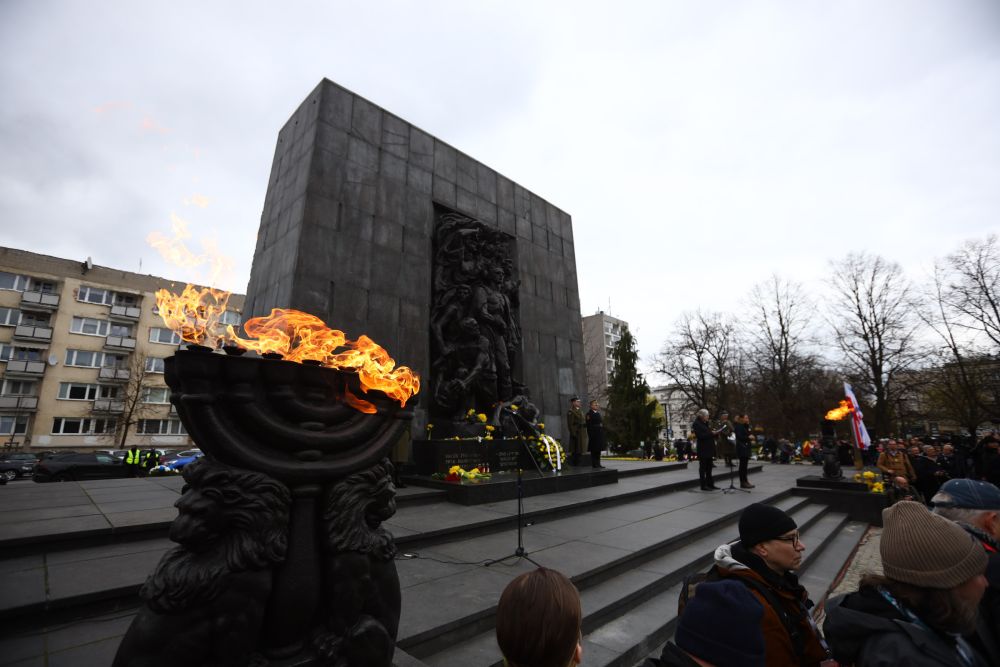- News
- Events
- Oneg Shabbat
- Collections
- Research
- Exhibitions
- Education
- Publishing Department
- Genealogy
- About the Institute
- Bookstore

%20(8).jpg)
Photo by Grzegorz Kwolek (JHI)
Earlier, at 11 AM, the first part of the ceremony took place in front of the Tomb of the Unknown Soldier at Marshall Józef Piłsudski Square, at which delegations paid tribute to the heroes of the Warsaw Ghetto. The main celebrations took place in front of the Monument to the Ghetto Heroes at Zamenhofa Street, former site of the ghetto. First, the song Zog nit keynmol az du geyst dem letstn veg [Don't say it's time to go the last way], written by the Vilnius ghetto prisoner Hirsz Glik (1922-1944) as he heard about the Warsaw Ghetto Uprising was sung by Aleksandra Idkowska.
‘Every year, both here, in front of the Monument to the Ghetto Heroes in Warsaw and in many other Polish cities, we remind you of an event that has become a symbol of the fight for a dignified death,’ read the actor Andrzej Ferenc, who led the ceremony. – ‘On the night of April 19, 1943, on the Pesach holiday, the Warsaw ghetto was surrounded by German troops. In the morning, the Germans entered the ghetto with the intention of its final liquidation. Members of the Jewish armed organizations: the Jewish Combat Organization, with its leader Mordechaj Anielewicz and fighters such as Marek Edelman, and the Jewish Military Union, led by Paweł Frenkel and Leon Rodal, put up unexpectedly strong resistance. The first metropolitan uprising in occupied Europe began.’
‘If we survive, then it will only be as free people. And if that is impossible, then as free people, we will die. We will overcome death in battle. This slogan accompanied the insurgents during the heroic uprising,’ said Ferenc.
The Chief Rabbi of Poland, Michael Schudrich, recited the El Malei Rachamim prayer for the victims and fighters of the ghetto.
The song Warszawo ma [O, my Warsaw] by Andrzej Włast (1895-1942/1943?) was sung by Aleksandra Idkowska.
At the Monument to the Ghetto Heroes, wreaths and flowers were laid by representatives of the President of the Republic of Poland, the Prime Minister, the President of the Capital City of Warsaw, MPs and senators, ambassadors, representatives of Jewish organizations and cultural institutions, members of the Jewish community.
At 3 PM at the Monument to the Joint Martyrdom of Jews and Poles located at the Jewish cemetery at Okopowa Street in Warsaw, wreaths were laid by representatives of the government, embassies, local authorities and cultural institutions.
The main organizer of the ceremony was the Social and Cultural Society of Jews in Poland, the co-organizers were the Jewish Historical Institute and the Warsaw Ghetto Museum, and the partner – the POLIN Museum of the History of Polish Jews.
Throughout the day, in the vicinity of the Ratusz Arsenał metro station, the employees of the Jewish Historical Institute took part as volunteers in the POLIN museum’s Daffodils Campaign, handing out paper daffodils to the city residents.